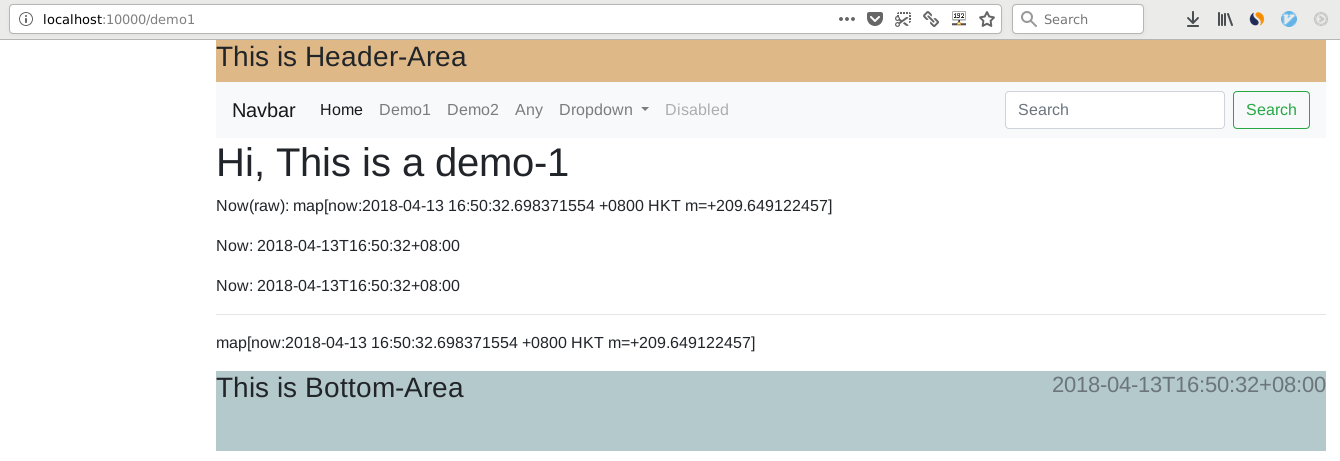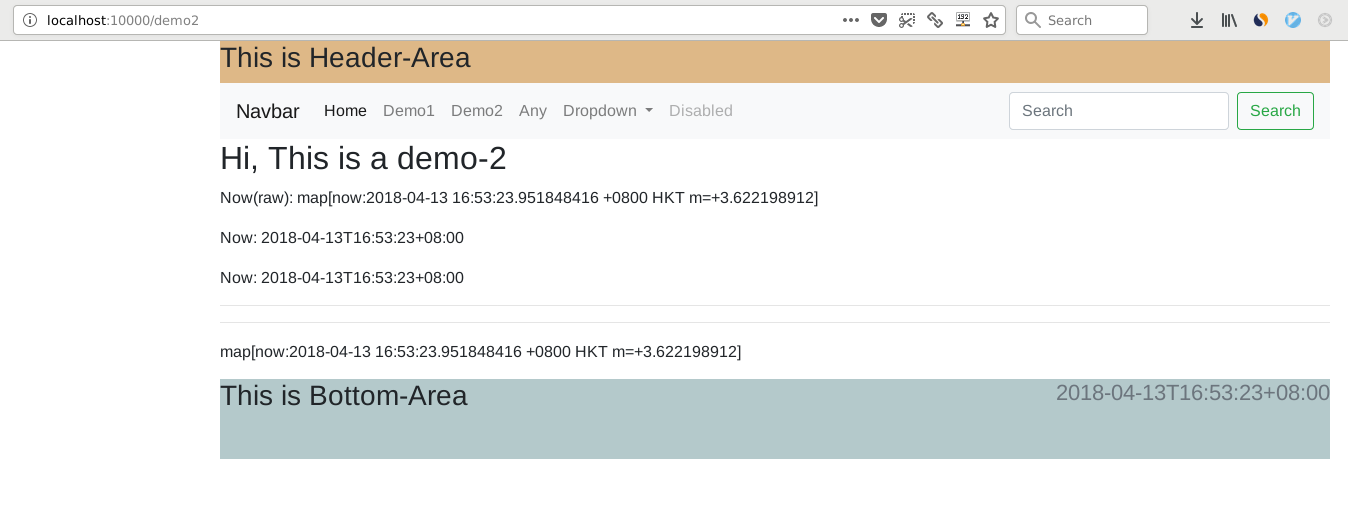Go(Golang) template manager, especially suited for web. Already supports gin server.
- Install
- Description
- TemplateEnv
- Examples
- Config Comments
- Deploy Mode
- Screenshots
- Benchmark
- A complete example of gin web server
- A Complete example of net/http server
- Licence
go get github.com/darkdarkfruit/templatemanager
Then use it:
import github.com/darkdarkfruit/templatemanager
Go(Golang) template manager, especially suited for web. Already supports gin server.
Features:
- support debug mode (Re-render the template when next request comes.)
- support production mode (Automatically enables template cache.)
- support context-render (template (nest/inheritance almost))
- support single file render (the same as html/template)
- support multiple files render (the same as html/template)
- support gin-gonic(gin) already
There are 2 types of templateEnv(aka: 2 types of templateName). Default is ContextMode which uses template nesting(somewhat like template-inheritance in django/jinja2/...)
ContextMode will load context templates, then execute template in file: FilePathOfBaseRelativeToRoot.
FilesMode is basically the same as http/template
- ContextMode: Name starts with "C->" or not starts with "F->"
eg: "C->main/demo/demo.tpl.html"
or "C-> main/demo/demo.tpl.html" (not: blanks before file(main/demo/demo.tpl.html) will be discarded)
or "main/demo/demo.tpl.html"
- FilesMode: Name starts with "F->". (default separator of multiple files is ";")
eg: "F->main/demo/demo.tpl.html"
or "F-> main/demo/demo.tpl.html"
or "F-> main/demo/demo.tpl.html;main/demo/demo_ads.tpl.html" (will use the first file name when executing template)
See detailed examples at examples/
templates/
├── context
│ ├── layout
│ │ └── layout.tpl.html
│ └── partial
│ └── ads.tpl.html
└── main
└── demo
├── demo1.tpl.html
├── demo2.tpl.html
└── dir1
└── dir2
└── any.tpl.html
// use gin as web server
...
func main(){
router := gin.Default() //
tplMgr := templatemanager.Default(true)
tplMgr.Init(true)
router.HTMLRender = tplMgr
}
...
// use gin as web server
...
func main(){
router := gin.Default() //
tplConfig := templatemanager.DefaultConfig(gin.IsDebugging())
tplConfig.DirOfRoot = templatesDir
tplConfig.FuncMap = template.FuncMap{
"FormatAsDate": FormatAsDate,
"time_ISOFormat": TimeISOFormat,
"unescaped": unescaped,
}
tplMgr := templatemanager.New(tplConfig)
tplMgr.Init(true)
router.HTMLRender = tplMgr
}
...
type TemplateConfig struct {
DirOfRoot string //template root dir
DirOfMainRelativeToRoot string //template dir: main
DirOfContextRelativeToRoot string //template dir: context
FilePathOfBaseRelativeToRoot string //template layout file path
Extension string //template extension
FuncMap template.FuncMap //template functions
Delims Delims //delimeters
IsDebugging bool // true: Show debug info; false: disable debug info and enable cache.
}
- debug mode
set "config: IsDebugging" to true.
eg:
templatemanager.Default(true)
- production mode
set "config: isDebugging" to false
templatemanager.Default(true)
- set by gin web server
templatemanager.Default(gin.IsDebugging())
Take examples/gin_web_server as an example
Env:
CPU: (Years ago with very poor performance)AMD Athlon(tm) X4 850 Quad Core Processor
MEM: 8G
# debug-mode
> wrk -d5 'http://localhost:10000/demo1'
Running 5s test @ http://localhost:10000/demo1
2 threads and 10 connections
Thread Stats Avg Stdev Max +/- Stdev
Latency 4.97ms 5.06ms 50.28ms 86.82%
Req/Sec 1.27k 295.83 2.61k 76.00%
12695 requests in 5.01s, 53.21MB read
Requests/sec: 2532.09
Transfer/sec: 10.61MB
# production-mode
> wrk -d5 'http://localhost:10000/demo1'
Running 5s test @ http://localhost:10000/demo1
2 threads and 10 connections
Thread Stats Avg Stdev Max +/- Stdev
Latency 1.21ms 2.32ms 36.00ms 90.58%
Req/Sec 10.09k 1.82k 15.99k 70.00%
100514 requests in 5.01s, 421.08MB read
Requests/sec: 20073.50
Transfer/sec: 84.09MB
package main
import (
"log"
"github.com/darkdarkfruit/templatemanager"
"time"
"net/http"
"html/template"
)
var isDebugging bool
var tplMgr *templatemanager.TemplateManager
//func init() {
//}
func time_isoformat(t time.Time) string {
return t.Format(time.RFC3339)
}
func HomeHandler(w http.ResponseWriter, req *http.Request) {
tplMgr.ExecuteTemplate(w, "main/home/home.tpl.html", map[string]interface{}{
"now": time.Now(),
})
}
func Demo1Handler(w http.ResponseWriter, req *http.Request) {
tplMgr.ExecuteTemplate(w, "main/demo/demo1.tpl.html", map[string]interface{}{
"now": time.Now(),
})
}
func Demo2Handler(w http.ResponseWriter, req *http.Request) {
tplMgr.ExecuteTemplate(w, "main/demo/demo2.tpl.html", map[string]interface{}{
"now": time.Now(),
})
}
func AnyFileHandler(w http.ResponseWriter, req *http.Request) {
tplName := "main/demo/dir1/dir2/any.tpl.html"
tplMgr.ExecuteTemplate(w, tplName, map[string]interface{}{
"now": time.Now(),
"tplName": tplName,
})
}
func main() {
log.SetFlags(log.LstdFlags | log.Lshortfile)
isDebugging = true
tplMgr = templatemanager.Default(isDebugging)
tplMgr.Config.FuncMap = template.FuncMap{
"time_isoformat": time_isoformat,
}
tplMgr.Init(true)
mux := http.NewServeMux()
log.Printf("isDebugging: %v", isDebugging)
mux.HandleFunc("/", HomeHandler)
mux.HandleFunc("/demo1", Demo1Handler)
mux.HandleFunc("/demo2", Demo2Handler)
mux.HandleFunc("/any", AnyFileHandler)
addr := ":10001"
httpAddr := "http://localhost" + addr
log.Printf("urls are: \n%s/ \n%s/demo1 \n%s/demo2 \n%s/any \n", httpAddr, httpAddr, httpAddr, httpAddr)
log.Printf("net-http-server is running at %s", addr)
http.ListenAndServe(addr, mux)
}package main
import (
"log"
"github.com/darkdarkfruit/templatemanager"
"github.com/gin-gonic/gin"
"html/template"
"time"
"net/http"
)
func time_isoformat(t time.Time) string {
return t.Format(time.RFC3339)
}
func HomeHandler(c *gin.Context) {
c.HTML(http.StatusOK, "main/home/home.tpl.html", gin.H{
"now": time.Now(),
})
}
func Demo1Handler(c *gin.Context) {
c.HTML(http.StatusOK, "main/demo/demo1.tpl.html", gin.H{
"now": time.Now(),
})
}
func Demo2Handler(c *gin.Context) {
c.HTML(http.StatusOK, "main/demo/demo2.tpl.html", gin.H{
"now": time.Now(),
})
}
func AnyFileHandler(c *gin.Context) {
tplName := "main/demo/dir1/dir2/any.tpl.html"
c.HTML(http.StatusOK, tplName, gin.H{
"now": time.Now(),
"tplName": tplName,
})
}
func main() {
log.Printf("gin mode: %s, isDebugging: %v", gin.Mode(), gin.IsDebugging())
router := gin.Default()
tplMgr := templatemanager.Default(false)
tplMgr.Config.FuncMap = template.FuncMap{
"time_isoformat": time_isoformat,
}
tplMgr.Init(true)
router.HTMLRender = tplMgr
router.GET("/", HomeHandler)
router.GET("/demo1", Demo1Handler)
router.GET("/demo2", Demo2Handler)
router.GET("/any", AnyFileHandler)
addr := ":10000"
log.Printf("gin-web-server is running at %s", addr)
router.Run(addr)
}

